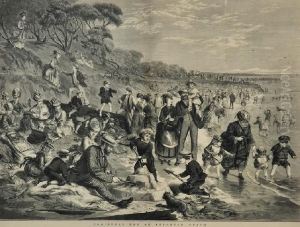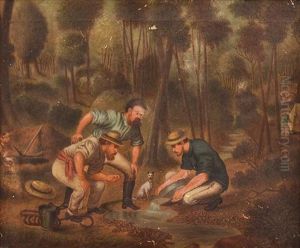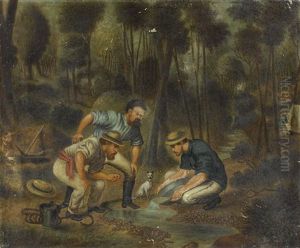Oswald Rose Campbell Paintings
Oswald Rose Campbell was a British landscape painter born in 1820. His artistic journey is often celebrated for its contribution to the British landscape tradition, which saw a significant evolution during the 19th century. Campbell's work is characterized by its detailed depiction of the British countryside, marked by a delicate handling of light and color that captures the transient beauty of nature.
Campbell's early life was defined by his passion for art, which led him to pursue his studies at the Royal Academy of Arts. This institution was pivotal in shaping the careers of many British artists, providing them with the necessary training and exposure to the classical principles of art. Campbell's education here laid the foundation for his future work, embedding in him a deep appreciation for the British landscape and its capacity to evoke emotional resonance.
Throughout his career, Campbell traveled extensively across Britain, seeking inspiration from its diverse landscapes. His paintings often depicted serene pastoral scenes, rugged coastlines, and the quiet beauty of rural life. These works resonated with the Victorian public, who found solace and national pride in their country's natural beauty amidst the rapid industrialization and urbanization of the era.
Campbell was part of a broader movement of British landscape artists who sought to capture the essence of their homeland's scenery. His contemporaries included artists like John Constable and J.M.W. Turner, whose works similarly celebrated the British landscape's unique characteristics. However, Campbell's paintings are distinguished by their more intimate scale and a subtler palette, emphasizing mood and atmosphere over dramatic effect.
Oswald Rose Campbell's contribution to British art was recognized in his time, and he exhibited his works at prestigious institutions such as the Royal Academy and the British Institution. His paintings are now housed in various art collections and museums, serving as a testament to his skill and sensitivity as a landscape painter.
Campbell's death in 1887 marked the end of a life dedicated to the exploration and celebration of the British landscape. His legacy lives on through his paintings, which continue to captivate audiences with their beauty and tranquility. Through his work, Campbell contributed significantly to the British landscape tradition, capturing the enduring charm of the countryside and its ability to inspire and heal.



